
The Canary Islands, also known informally as the Canaries, are a Spanish autonomous community and archipelago in Macaronesia in the Atlantic Ocean. At their closest point to the African mainland, they are 100 kilometres west of Morocco and the Western Sahara. The Canary Islands are part of Spanish Africa. They are the southernmost of the autonomous communities of Spain. The islands have a population of 2.2 million people and are the most populous special territory of the European Union.
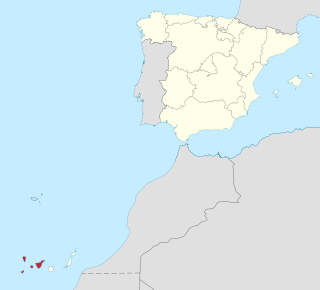
Province of Santa Cruz de Tenerife, also Province of Santa Cruz, is a province of Spain, consisting of the western part of the autonomous community of the Canary Islands. It consists of about half of the Atlantic archipelago: the islands of Tenerife, La Gomera, El Hierro, and La Palma. It occupies an area of 3,381 km2 (1,305 sq mi). It also includes a series of adjacent roques.

The Diocese of San Cristóbal de La Laguna, also called Diocese of Tenerife or Diocese Nivariense, is a diocese located in the city of San Cristóbal de La Laguna in the Canary Islands and a suffragan in the ecclesiastical province of the Archdiocese of Sevilla in Spain. The diocese includes the islands of Tenerife, La Palma, La Gomera and El Hierro, in the province of Santa Cruz de Tenerife. The bishop of this diocese is Bernardo Álvarez Afonso.

In March and April 2009, an outbreak of a new strain of influenza commonly referred to as swine flu infected many people in Mexico and parts of the United States causing severe illness in the former. The new strain was identified as a combination of several different strains of Influenzavirus A, subtype H1N1, including separate strains of this subtype circulating in humans and in pigs. Spain was the first country in continental Europe to report cases of swine flu, in late April 2009.
As in the rest of Spain, the majority religion in the Canary Islands is the Catholic Church. The Catholic religion has been the majority since the Conquest of the Canary Islands in the fifteenth century. This religion would largely replace the Canarian aboriginal religion through the prohibition of the latter and syncretism. According to a survey conducted in 2019, Canary Islands is the fifth autonomous community in Spain with the highest percentage of people who declare themselves to be Catholics after the Region of Murcia, Extremadura, Galicia, Aragon, and Castile and León. 76.7% of the population is Catholic.

Agoney Hernández Morales, also known as Agoney, is a Spanish singer, composer and performer who rose to fame from his participation on the Operación Triunfo 2017 programme. Due to his great vocal potential and the versatility of his voice—and in reference to his home of the Canary Islands—he has been nicknamed "the Canary with the golden voice".

Salvador Illa Roca is a Spanish politician who served as Minister of Health of Spain from 2020 to 2021. He has been the Secretary for Organization of the Socialists' Party of Catalonia since 2016, and the candidate for the presidency of Catalonia for this party. Previously, Illa served as Mayor of La Roca del Vallès from 1995 to 2005.
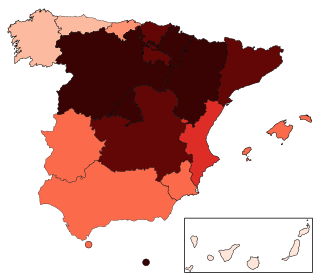
The COVID-19 pandemic in Spain has resulted in 13,980,340 confirmed cases of COVID-19 and 121,852 deaths.
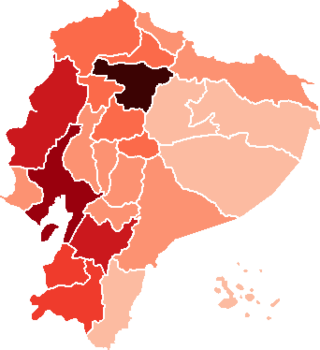
The COVID-19 pandemic in Ecuador was a part of the worldwide pandemic of coronavirus disease 2019 caused by severe acute respiratory syndrome coronavirus 2. The virus was reported to have spread to Ecuador on 29 February 2020, when a woman in her 70s tested positive for the virus. Ecuador was described in April as emerging as a possible "epicentre" of the pandemic in Latin America, with the city of Guayaquil overwhelmed to the point where bodies were being left in the street.
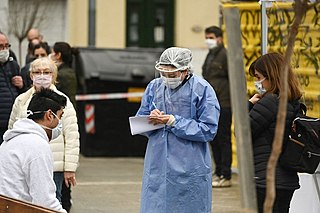
The COVID-19 pandemic in Argentina is part of the worldwide pandemic of coronavirus disease 2019 caused by severe acute respiratory syndrome coronavirus 2. As of 28 February 2024, a total of 10,078,785 people were confirmed to have been infected, and 130,548 people were known to have died because of the virus.

The worldwide pandemic of coronavirus disease 2019 caused by severe acute respiratory syndrome coronavirus 2 severely affected Chile. The virus was confirmed to have reached Chile on 3 March 2020. Initial cases had been imported from Southeast Asia and Europe, and expanded into a large number of untraceable infections, placing the country within phase 4 of the pandemic as defined by the World Health Organization, with over 1,000 confirmed cases by 25 March 2020.
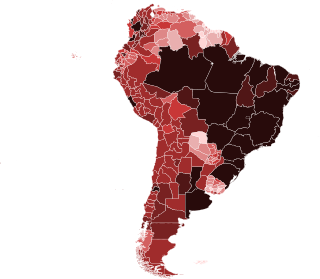
The COVID-19 pandemic was confirmed to have reached South America on 26 February 2020 when Brazil confirmed a case in São Paulo. By 3 April, all countries and territories in South America had recorded at least one case.
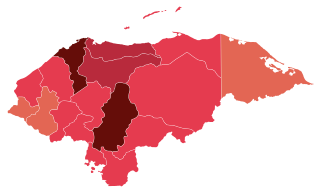
The COVID-19 pandemic in Honduras was a part of the worldwide pandemic of coronavirus disease 2019 caused by severe acute respiratory syndrome coronavirus 2. The virus was first confirmed to have spread to Honduras on 10 March 2020, when two women tested positive for the virus after one of them landed on Toncontín International Airport in a flight from Madrid, Spain, and the other on Ramón Villeda Morales International Airport in a flight from Geneva, Switzerland. Confirmed cases have been reported in all 18 departments of the country, with the majority of cases located in Cortés and Francisco Morazán.
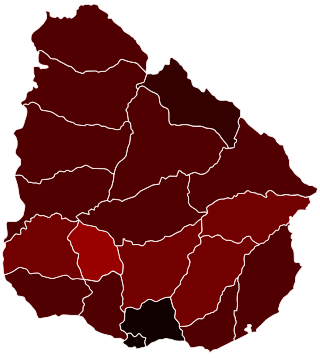
The COVID-19 pandemic in Uruguay has resulted in 1,037,906 confirmed cases of COVID-19 and 7,625 deaths.

The COVID-19 pandemic in El Salvador was a part of the worldwide pandemic of coronavirus disease 2019 caused by severe acute respiratory syndrome coronavirus 2. The virus was confirmed to have reached El Salvador on 18 March 2020. As of 19 September 2021, El Salvador reported 102,024 cases, 3,114 deaths, and 84,981 recoveries. As of that date El Salvador had arrested a total of 2,424 people for violating quarantine orders, and 1,268,090 people had been tested for the virus. On 31 March 2020, the first COVID-19 death in El Salvador was confirmed.
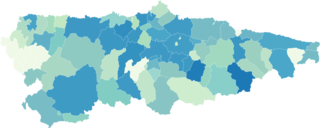
The COVID-19 pandemic in Asturias was part of the Spanish outbreak of the worldwide COVID-19 pandemic.
In the run up to the 2015 Spanish local elections, various organisations carried out opinion polling to gauge voting intention in local entities in Spain. Results of such polls for municipalities and island cabildos in the Canary Islands are displayed in this article. The date range for these opinion polls is from the previous local elections, held on 22 May 2011, to the day the next elections were held, on 24 May 2015.

The COVID-19 pandemic in Cuzco is part of the worldwide pandemic of coronavirus disease 2019 caused by severe acute respiratory syndrome coronavirus 2. The virus was reported to have spread to Cusco on 13 March 2020, when a 37-year-old man who had travelled to United States tested positive. The start of the epidemic outbreak in The country, also called "community transmission", was announced on March 17, 2020, while the first death was reported a week later. As time passed, the outbreak spread throughout the department, Paruro being the last province to report its first positive case on May 6, 2020. In the district of Villa Virgen, La Convención Province, a first positive case of contagion by COVID-19 was confirmed on August 24, 2020, becoming the last district of the department to declare the presence of infected persons. The exponential increase in infections, which occurred since the third week of July, positioned Cuzco as the third department with the most cases in Peru.















